#just a grumpy herman drawing
Text
"Patient, Herman!"
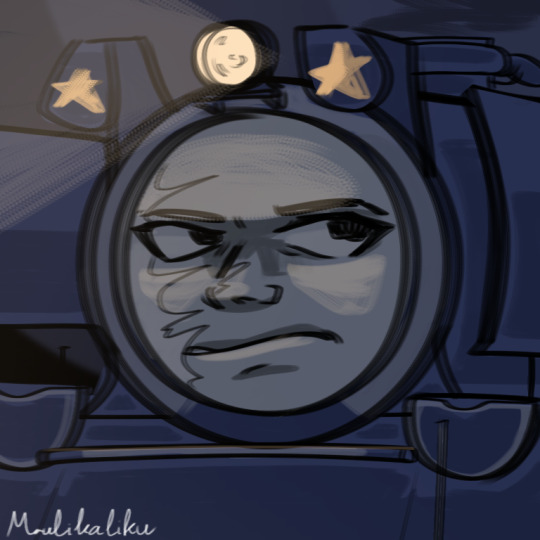
#just a grumpy herman drawing#probably getting impatient to move because its in the middle at the night and its freight so its much creepier?? dunno#ttte oc#maulidsart#aku ada adiksi menggambar herman#beneran#DKA D52 Class#D52080#also hi guys
24 notes
·
View notes
Text
Behind my designs of the dads!

Glenn: my immediate thoughts about Glenn was that he reminded me a lot of Greg Universe (Steven´s dad from Stevens Universe).
I felt like he had the vibe of someone who used to be someone, if that makes sense? However, they revealed their ages to be around 35 and I felt that was a little too early in life for that specific vibe.
Basic character design is like “sharp angular shapes for cool characters” and Freddie is the only one who actively describes his character´s appearance, I feel? Mentioning his long hair, handsomeness and muscles.
Anyway, having limited artistic abilities I basically started drawing Glenn how I usually would one of my oldest oc’s, Herman! The only real differences were colors and the fact that Herman had an eyepiece. BUT OH—WHAT HAPPENDED?? Glenn went and got his eye knocked out and had to wear an eyepatch.
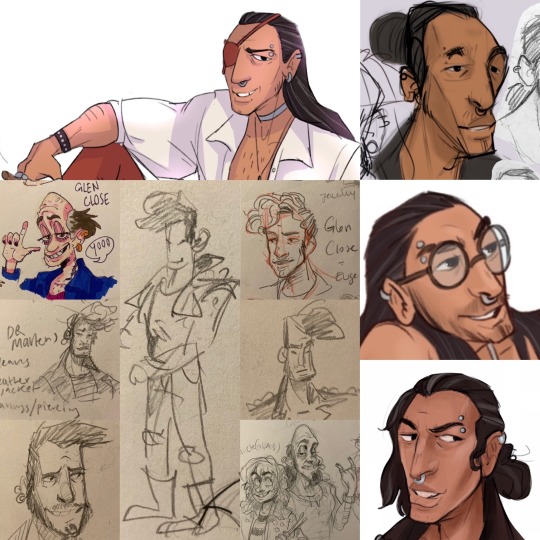
I love that people seem to like how I draw Glenn. But at the same time. IT IS a little bittersweet. Cause now I feel like i´ve wasted a Good Design on fanart, which is such a dumb thought, cause that is not all what’ve happened!! Glenn is a way better character than Herman could ever be. Plus I don´t even draw Herman like that anymore.
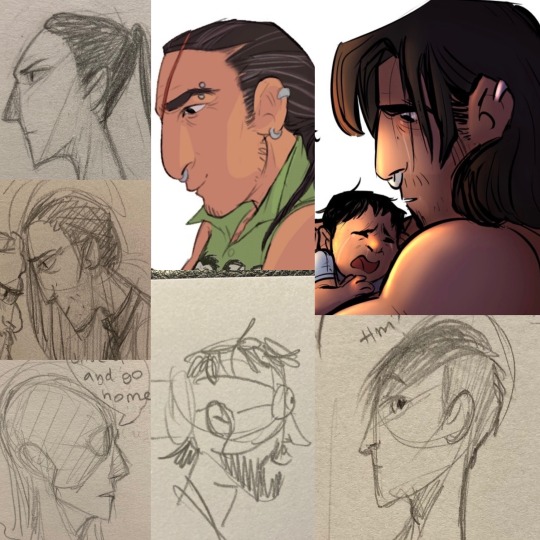


Ron: I feel like most people had a hard time figuring out what they wanted Ron to look like, cause he´s just a weirdly unique character. My immediate thought was to draw him as a stereotypical truck driver, cause of various reasons such as the “racist” comment and just the dry humor and general grumpiness. HOwever!! Everything changed when I started comparing the dads with the Try Guys, and Zac would make a perfect Ron. Cute. I guess. I´ve also always loved the idea of Ron having cat eyes? Like they´re slits most of the times, but get completely round when he´s being cute. I don´t think I´ve really managed to capture that in any drawing yet tho. And once upon a time I drew Ron with big brown fluff of hair, which annoyed me cause it looked way to much like how I did Henry´s hair (again limited artistic abilities). So, it was great when Beth was like “he´s bald”.
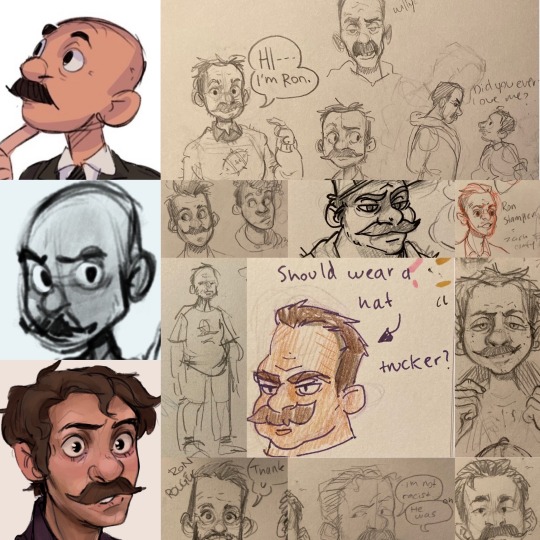
Darryl: I feel like the general vibe hasn´t really changed with him and how I draw him. Back to the same character design theory, he´s a square- not much to say. I like him being ginger cause, I mean, when I blush I go insanely red and I just think that´s a feature a big awkward dude like Darryl should have.
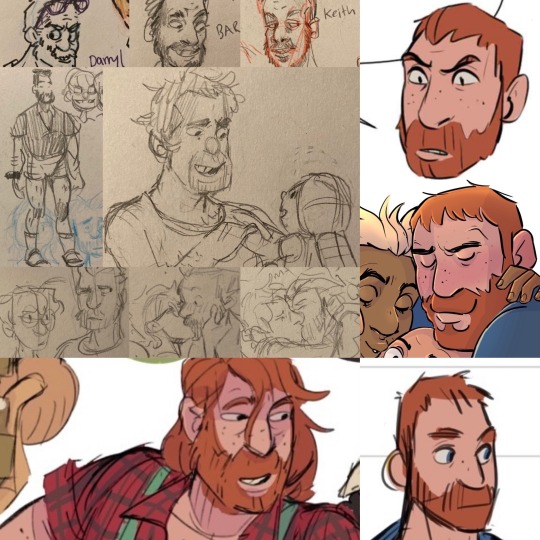
Henry: In my mind Henry could literally be anything, but not in the same way as Ron. The first couple od sketches I did of Henry I tried to make him look like a real preppy guy with an indian background. But I also really loved the idea of him having been like a popular jock in high school, to be a stereotypical frat guy in college and now like a Steve Rogers wannabe father of two malicious children. Again with the Try Guys, Ned fit really well into this, except he wasn’t buff, so I guess that´s what happened to that idea. I think another Big Inspiration for Henry was my high school boyfriend.
Also. I don´t care what Will is trying to do here. I respect his decision of having a smelly nasty druid, but I will not partake. Will Campos´ voice is genuinely one of the hottest things i´ve ever heard and I will draw him accordingly.



Thank you for coming to my TED talk
115 notes
·
View notes
Text
Won't Happen Again : Epilogue to Chicago Med 2x17
Jay spotted him slumped over a beer in the far back booth. It was one of the rare occasions he felt sorry for the guy. But he was sure today had been a tough one for him so when he’d called and asked Jay to meet him for a beer Jay didn’t hesitate to agree.
Jay stopped briefly at the bar to greet a few friends and order a beer before making his way to the back of the bar. He plunked his beer on the table and sat on the stool across from his brother.
“Hey, how you holding up?” Jay asked Will.
Will raised his head and gave a forced smile as his answer. “Hey, thanks for meeting me.”
“Of course,” Jay nodded.
They sipped their beer in silence, both casually scanning the bar, watching the patrons laugh and drink their daily stress away.
“You okay?” Jay asked after a few minutes. Will was the talkative one of the two and his lengthy silence had Jay concerned.
“Do you know that most doctors consider suicide at some point during their residency?” Will asked, still shocked by this fact.
Jay’s back straightened, his eyes inspected Will looking for signs his big brother was sending him distress signals.
Will raised his hand. “I’m fine. But that’s just it. It never occurred to me. I never got to that place. I had no idea so many residents struggled like that.” He took a swig of his beer. “I don’t know, maybe it’s the Halstead genes. Push everything down, don’t feel too much and sure as hell don’t talk about your feelings.” He laughed bitterly. “Can you imagine what dad would say if he walked in here right now? The names he’d call us?”
Jay snorted and took swig of beer.
“And now we have these women in our lives, wanna talk about feelings all the damn time,” Will moaned.
“Speak for yourself,” Jay said flatly. “Erin’s harder to crack then a damn bank vault.”
“I don’t know man, the way that girl’s eyes light up whenever someone says your name, she can’t hide those feelings,” Will teased.
Jay smirked confidently, “Well, I mean when you’ve got the best,” he bragged.
Will laughed shaking his head, “Shut up.”
“Seems to me you’re the one who’s got all kinds of feelings to work out,” Jay teased, putting air quotes around the word feelings.
“What are you talking about?”
“Dude, you’re living with one girl and can’t shut up about another,” Jay observed.
“That’s not true!” Will said defensively.
“No? Nat this, Nat that, all the damn time,” Jay mocked. “Nina’s gonna catch on soon and you’re gonna find yourself homeless,” Jay warned. “And don’t,” he continued raising his finger and pointing at Will, “even consider crashing on my couch. No way am am I dealing with you and Erin first thing in the morning.”
“Not much of a morning person is she?” Will asked laughing, avoiding Jay’s comments about Natalie.
“You have no idea,” Jay laughed but there was something in his eyes that told Will Jay was perfectly content to deal with Erin’s grumpy moods.
Will laughed too. He’d never seen Jay like this before. His dark brooding little brother, who would rather hide in his room than deal with the world and then later ran away to war so he wouldn’t have to deal with his own demons only to be saddled with even more demons, seemed more settled and more at peace these days, happy even. He’d had his doubts about Erin, especially after she dropped into a self destructive spiral without concern that she’d gutted Jay, but clearly she had got her shit together and was helping him carry his load.
“Hey, where’d you go?” Jay asked, drawing Will’s attention back.
Will second guessed himself for a moment before speaking, but after today he knew he just needed to say what was on his mind. “I’m sorry I wasn’t there for you when we were kids and after… after you got home. And I’m sorry you had to deal with dad on your own when mom died,” he blurted out.
Jay didn’t respond at first, just took a swig of beer and swallowed, grimacing like the liquid burned going down. “It the past man,” he said, waving off Will’s apology.
“Well, it won’t happen again. You need anything…”
“I’m good, but thanks. Besides you called me remember?” Jay said interrupting Will.
“Yeah, I did,” Will nodded. The silence stretched between them again before Will grew impatient with his own mood. “Okay enough of this, you see the Sox game last night? Quintana pitched like shit!”
“It’s only spring training,” Jay reasoned.
Will and Jay argued baseball and drank beer after beer until a petite brunette placed a hand on each of their shoulders.
“I don’t know why you waste your breath, the Cubs are gonna kick their asses again anyway,” Erin announced amused.
“Erin! What are you doing here babe, thought you were having dinner with a friend tonight,” Jay asked as he leaned over to kiss her.
“I was, that was hours ago and then I got a call from the bar owner,” she said thumbing in Herman’s direction, “ said there were two rowdy Irish boys disturbing the peace and drinking all his beer,” she laughed. “Poor man wants to close up and go home.”
Jay and Will looked around the now empty bar then at each other and laughed drunkenly. They had lost track of time and closed the bar down.
“Hermann!” Will called, “since when you shy about kicking people out?”
Hermann laughed as he walked over to them. “Since never, but I know you had a rough day, figured I’d bend the rules a bit for you.”
“Well I appreciate that,” Will said slightly slurred, “but you didn’t have to call us a chaperone. We know how to hail cabs.”
“Eh,” Hermann shrugged. “I’ll sleep better knowing you two goons aren’t out inflicting your enthusiasm for the Sox on the rest of this fine city. No one deserves that.” He said in mock seriousness while walking them to the door.
Will flung his arm around Erin’s shoulder. “Lindsay, I like you,” Will announced, “even if you are a Cubs fan.”
Erin laughed up at him and shook her head. When drunk the Halstead boys thought the were even more charming.
“Hey,” Jay called a step behind them. “That’s my girl you got your grubby hands on.” He moaned.
“Relax Halstead, I ain’t trying to steal your girl,” Will mocked as he pulled Erin closer to his side, knowing it would fuel Jay’s fire.
Erin rolled her eyes, it was gonna be a long drive getting these two home.
103 notes
·
View notes
Text
SPAM Digest #3 (Nov 2018)
A quick list of the editors’ current favourite critical essays, post-internet think pieces, and literature reviews that have influenced the way we think about contemporary poetics, technology and storytelling.
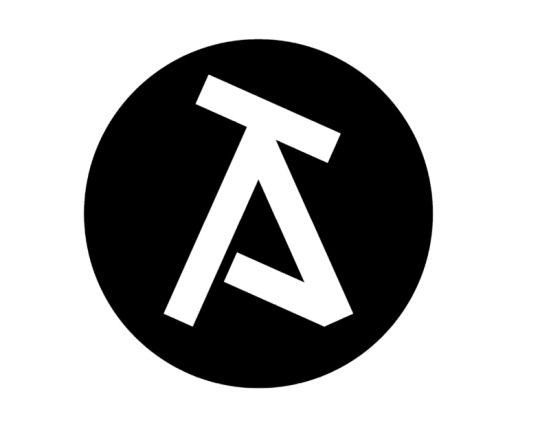
Deborah Smith of Tilted Axis Press on translation, at the International Literature Showcase 2017.
Literature from outside of Europe tends to get read more anthropologically than as art, and so we're publishing you things that are surreal or experimental , or that are at least innovative in some way.
Deborah Smith talks here both of translation and the ethos behind the non-profit press she founded, Tilted Axis. One of the points that resonated most with me was her recognition that literature outside of Europe, more often than not, is read anthropologically rather than as art. Is it a fair assumption to say that we, as western readers, would see a work of Thai or Indonesian literature as a doorway to furthering our understanding of that culture, but would be slower to consider the work critically and artistically, even when the style, form and ideas are innovative and experimental? Speaking on behalf of myself, I would say I've been prone to this.
Of course, translated literature, the 'lifeblood of English', as Smith puts it, does offer us an opening into cultures, traditions and ideas different from our own. Yet I found it truly refreshing when purchasing Prabda Yoon's Moving Parts from Tilted Axis to not find myself pondering what this book will teach me about Bangkok Culture. When reviews from authors such as Eley Williams read 'Sleek, supple and soaring – in this extraordinary translation, Prabda Yoon’s stories command your attention', any anthropological curiosities are overtaken by artistic interest.
As Smith points out in this talk, translators act as the literary 'gatekeepers', deciding which works make it across our borders. Traditionally, more unknown and underrepresented writers from countries in Asia haven't had such a platform to share their works in English, with larger publishing companies picking the writers they deem to be worthy of translating. Founded only three years ago, in 2015, Smith's press is the first to publish contemporary fiction in Uzbek and Thai in the United Kingdom. Just with that achievement alone, I think it would be fair to say that Tilted Axis is unique in the platform it is offering to the British public.
M.P.
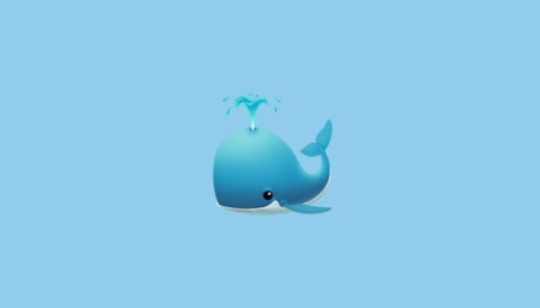
‘Emoji Dick and the Eponymous Whale, An Essay in Four Parts’ by Lisa Gitelman on Post45
[This strong recommendation comes with a flashing *very long read* alert]
This is without a doubt the most thorough and exhaustive commentary on the seminal post-iphone experiment that is Emoji Dick - an pictorial novel written by Herman Melville, edited and compiled by Fred Benenson, and translated into emoji by the hundreds of labourers that quietly operate behind Amazon Mechanical Turk . Gitelman’s essay approaches the Melville x Benson enterprise as 'a ludic contact zone between human intelligence and algorithmic processing', and as a beautifully layered example of what falls 'between literature and whatever the fate of the literary may be in an ever more digitally mediated and data-described world'.
What stands out about this essay is that Gitelman chooses to focus on the easily overlooked conditions of textual production involved in such a complex experiment - one that could, perhaps superficially, be considered simply for its conceptual significance. Gitelman draws parallels between the material manufacture of Moby Dick, the 19th-century physical novel, and the genesis of Emoji Dick the kick-started, self-published, on-demand book (do we still get to call it a novel?), as well as the politics behind the different types of labour involved in such different processes (from physical typesetting and letterpress printing, to crowdsourcing, algorithmic mediation and coding).
Questions of pictorial and collaborative translation are also raised, with reference to the west’s early approaches to Chinese and Japanese pictograms, the struggles that go along with the digitisation of the physically printed, the potential shortcomings of pictorial cataloging through linguistic methodologies, and illegibility as an artistic or conceptual statement in today’s literary landscape.
‘My students have observed that half the fun of Emoji Dick is saying it. They like the word dick, yes, but there is pleasure in the whole title. The word emoji, like the word perestroika is an untranslatable. It functions as a "checkpoint," marking a historically specific zone of contact and frisson between languages, the paradoxical crux of incommensurability and pleasurable accommodation. And just as perestroika is a Romanized untranslatable that we can date to the Gorbachev era of the 1980s, emojiis a transliterated untranslatable evolved in and of our networked present. Like other untranslatables, it can be reckoned "as a linguistic form of creative failure with homeopathic uses."’
D.B.
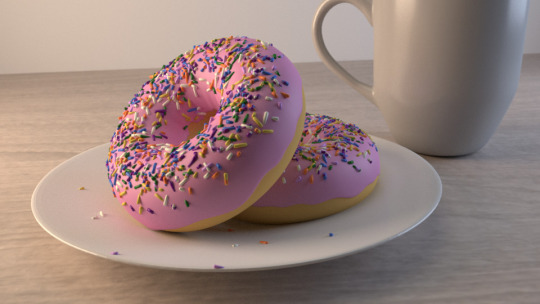
Image Source
‘Of Donuts I Have Loved’, by Miranda Dennis, Granta
I’ve been thinking about the value of the empty calorie lately. What it means to say, ‘treat yourself’ and how capitalism confects a version of spiritual nourishment that often comes in greasy wrappers. The damage and beauty in that, a little transient snack for the stressed commuter. To bestow upon your workmates a box full of donuts. Lore of rings and holes, orbital dough and icing halos. The donut’s performative, Sunday innocence. In a series of shorts that detail encounters with donuts, Miranda Dennis sketches a lovely reflection on hunger and care and the need to feel ‘whole’. The way our favourite snack brands offer a pharmakon source of regret and relief, how we find ourselves glitched on sugar’s addictive logic. She depicts a soft phenomenology of the donut. To see yourself sweet, to indulge those rituals that make us feel safe. This is the culinary memoir I want to read: not an oyster in sight, no grumpy men in whites with knives; instead the playful economy of snacks and comfort and female bodies. The acknowledgement of food as more than an expression of style or embodied nutrition. Food as narrative fact, as catalyst for complex affects: the precise oscillations between sadness and joy, the transitional digest of mood within us.
M.S.
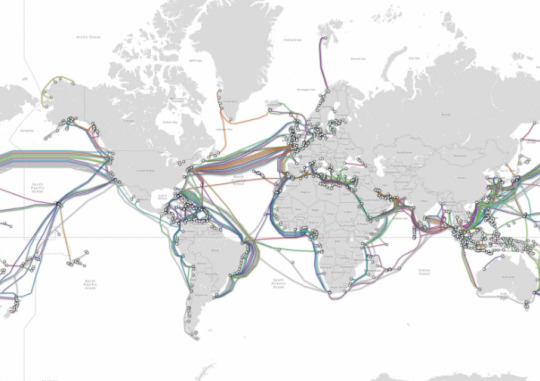
What is the internet? by Ian Sample, The Guardian
Most people, myself included, would think to know the answer to a question as obvious as this. Having been present at the Dark Mycology reading group, run by the Glasgow based Art & Ecology collective, I noted that one guest speaker pointed out how many people never envisage the internet in its physical form, and speak of it as if it really were wholly immaterial.
If someone were to ask me 'what is the internet?', I'd tend to explain it as a network of connections, focusing mostly on its functions/what it makes possible. My answer would probably focus on the immaterial, the web of shared information existing in a hyperspace, seemingly without any grounding in the physical world. Flashes of hyperlinks and search engines would surface before any images of deep sea ethernet cables came to mind. The question of what the internet actually is in its physical form didn't come as wholly new knowledge to me. Nor would I imagine it does for many others. Yet although I was at least partially aware of these elements, there's something quite novel about picturing the internet for what it is in its material form: hundreds of thousands of miles of underwater cables spanning all corners of the globe, connecting hundreds of nations.
To try to visualise the seemingly endless bank of information that flows through cables the width of hosepipes is quite magical when you consider the specifications of such a network: information passing at the speed of light through fibre optic threads the width of a single hair. There's something so painfully delicate about that image when you begin to think how more and more to the elements that allow our lives to function rely on the intactness of those small, underwater tubes. With an ever-growing number of lives now inseparable from online space, matched with a growing dependence on connectivity, it is too interesting to see how even in its physical form, all users are connected. The damage to two marine cables near the Egyptian port of Alexandria, which left many users in India and Pakistan without internet, illustrates how delicate such seemingly secure connections can be.
0 notes
Text
Meet Manivald, a Wannabe Troubadour with Mommy Issues
Our latest animated short, Manivald, is having quite the festival run! Recently, it’s been accepted in official competition at the prestigious Animafest Zagreb in Croatia, the Annecy International Animated Film Festival in France, and the Anima Mundi Festival in Brazil.
Discover more about Manivald, a wannabe troubadour with mommy issues, below!
About the film
Manivald, a fox, is turning 33. Overeducated, unemployed and generally uninspired, he lives with his overbearing, retired mother and spends his days learning piano while she makes his coffee and washes his socks. Their unhealthy co-dependence is about to collapse when the washing machine breaks down and in comes Toomas, a sexy and adventurous wolf repairman, to fix it, and them.
Tinged with typically absurdist Estonian humour, and featuring animator Chintis Lundgren’s faulty but loveable anthropomorphic characters, Manivald mixes the surreal and the heartfelt in its timely tale of an emotionally unnourished generation that continue to live with their parents well into their adult lives. The film pokes fun at the loving but sometimes unhealthy ties that bind parents and children, while celebrating the liberties of independence, self-discovery and growth.
A co-production between the National Film Board of Canada, Adriatic Animation, and Chintis Lundgreni Animatsioonistuudio, Manivald is Lundgren’s sly, quirky and refreshing take on the difficult and delicate bonds between a mother and son.
vimeo
Interview with Chintis Lundgren
NFB: Your work tackles contemporary adult issues, yet you use animals as protagonists. Why? What inspired you to use animal characters? What do you feel it adds to your work?
Chintis Lundgren: They’re simple to draw and I’m lazy. But also they’re easier to relate to than human characters, and that gives you a chance to laugh at yourself. Anyone can recognize themselves in a fox or in a rabbit, but if it was a bald man with a moustache, the character would only be relatable to other bald, moustached men.
NFB: Manivald deals with what seems to be a very contemporary issue: educated young adults living at home with their parents. What do you think has created this situation, and why did you feel this was a subject that needed to be explored?
CL: I don’t think anyone really wants to grow up: I certainly don’t. Being independent is nice, but having to work nine hours a day is so boring. I was 25 when I got my first job, and I really didn’t want to, but my mother went bankrupt and moved to another country. I also tried to live without money, so I ate mouldy bread and drank cheap vodka for six months, but in the end it started to affect my health, and I decided to get a job.
I and my co-writer, Draško Ivezić, decided to explore this topic because we know quite a few adults who still live at home, and we wanted to make something these friends of ours (or their parents) could hopefully laugh about. Hopefully it will scare them into moving out.
NFB: A unique aspect of the Manivald story is the straightforward way in which sexuality is explored. Was it important to you to avoid making a big deal out of sexuality?
CL: Yes, it was important. Making a big deal out of Manivald being gay (or his mother being sexually liberal) would mean presenting it as if it’s something that’s not really normal, and I think being gay (or sexually liberal) is totally normal, so why not treat it as such?
The Style
NFB: Most of your films are very distinct, visually. Aside from that rough and minimal design that people often associate with Estonian animation, all of your films are dominated by strong shades of red and brown (along with some white and black). There’s almost an earthy feel. What is the appeal of these colours?
CL: Experiencing a perfectly balanced monochrome picture gives me a strange sense of satisfaction. I can’t explain why, but having too many different colours in one frame disturbs me. At the moment, I really like the combination of different shades of reds and pinks; I’m not sure why, I just like it. I probably also spend way too much time on this.
The Absinthe Rabbits universe
Chintis and co-writer Draško Ivezić are currently developing a series called Manivald and the Absinthe Rabbits, named after the travelling group of drunken musicians that show up in Manivald.
It focuses on Manivald’s life after Manivald, and involves more hilarious and quirky animals like a cross-dressing hedgehog named Tiit who runs a clandestine gay bar called The Hedgehog’s Closet, and his wife, a conservative but oblivious, bear named Brunhilda (who, according to Chintis, hasn’t noticed that it’s a gay bar or that her husband is a cross-dresser). Brunhilda has some secrets of her own, since she’s having a secret affair with a local policeman, Herman, a grumpy rat from Chintis’ previous short film, Life with Herman H. Rott, which you can watch below.
vimeo
Follow Manivald and the Absinthe Rabbits on Facebook
About the Director
Chintis Lundgren is an Estonian-born animator currently living in Croatia. She studied fine arts at an alternative art school in Estonia called Academia Non Grata before pursuing a career as a painter. Lundgren later taught herself animation and quickly gained attention in the animation world for her quirky music videos, PSAs, and short films featuring a light, absurdist tone and distinctive anthropomorphic characters. In 2011, Lundgren created her own animation studio, Chintis Lundgreni Animatsioonistuudio, and later co-founded Adriatic Animation, an animation studio based in Croatia.
Social media
Follow Manivald on Facebook!
Talk about the film on Twitter: #Manivald
The post Meet Manivald, a Wannabe Troubadour with Mommy Issues appeared first on NFB/blog.
Meet Manivald, a Wannabe Troubadour with Mommy Issues posted first on http://ift.tt/2sCUYNt
0 notes